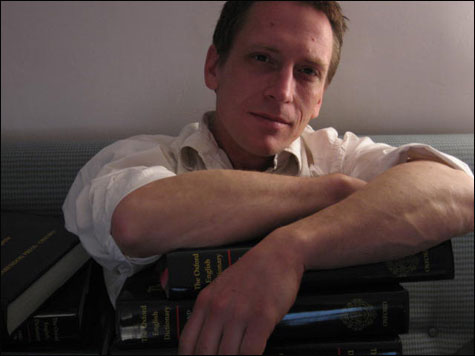
CHRESTOMATHIC That is, Shea is “devoted to the learning of useful matters.”
Can you judge a book by its title? You can if it’s Ammon Shea’s Reading theOED: One Man, One Year, 21,730 Pages. What that title doesn’t answer is the question “Who would do such a thing?” Ammon Shea, it turns out, is not some dictionary dilettante hoping to read his way into the Guinness Book of World Records. Although he’s worked as a street musician in Paris, a gondolier in San Diego, and a furniture mover in New York City, his real business is words, and to that end he owns “about a thousand volumes of dictionaries, thesauri, and assorted glossaries.” Those would include seven different copies of the Oxford English Dictionary. No question he’s the man for the job.
| Reading the OED: One Man, One Year, 21,730 Pages | By Ammon Shea | Perigee | 240 pages | $21.95 |
Reading the OED is laid out in 26 chapters, A to Z, with an “Exordium (Introduction)” and an “Excursus (Bibliography).” Shea begins each chapter with five or so pages describing his progress through the dictionary; that’s followed by anywhere from 10 to 30 words drawn from the OED and starting with the appropriate letter, for which he supplies, in the manner of Samuel Johnson, his own pungent commentary. For example:
Fard (v.) To paint the face with cosmetics, so as to hide blemishes. I suspect there is a reason no one ever gets up from the table and says, “Excuse me while I go to the ladies’ room and fard.” It seems to be very difficult to make a four-letter word that begins with f sound like an activity that is polite to discuss at the dinner table.
Shea’s selections are fun and edifying, but I was more engaged by his account of his own reading. The decision to dispense with modern technology (no reading on-line, or via overhead projector) and just sit down with the 20 volumes, for eight to 10 hours a day. The headaches, the grayed-out vision, the endless cups of espresso. The explanation of how the OED differs from other dictionaries. The distractions at home (car alarms, neighbors dancing and cooking salt cod) and the subsequent retreat to Hunter College Library. The attempt to introduce some fresh air into the project, which takes him to Central Park and then Hoboken and finally back to his HCL basement corner. His impromptu decision to attend the “biannual” (biennial?) convention of the Dictionary Society of North America, in Chicago. His musings on the word “set,” which alone takes up 25 OED pages. The observation that the OED “does not explain how to pronounce words that have not been in common use for hundreds of years for the simple and very good reason that the editors do not know how the words are pronounced.” (Does this mean that eventually we’ll all be text-messaging instead of talking?)